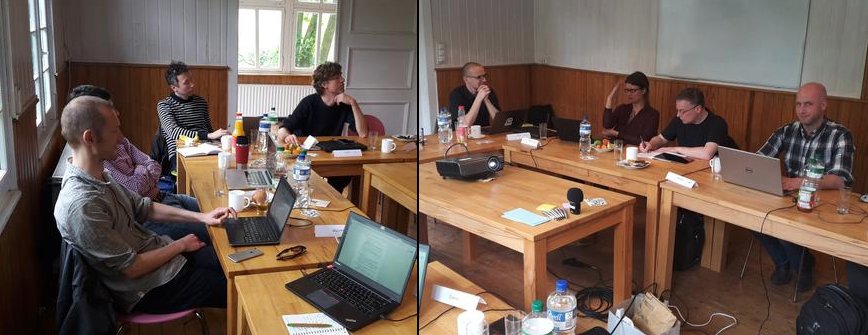State of the project and next steps
17 May 2017 | By Daniel Nüst, Markus Konkol, Marc SchutzeichelYesterday the o2r team met for the second time with a group of experts to request feedback on the state of the project.

Image is licensed under a CC BY-NC-ND 4.0 International license.
Thanks to the valuable questions and comments by our external partners, the project tasks were assessed and refocussed. On top of it, we agreed to collaborate even further and sketched first ideas for putting o2r’s prototypes into real-world settings.
This workshop was only possible thanks to our partner’s commitment, enthusiasm, and continued interest in the project. Our heartfelt thanks go to
- Xenia van Edig, Business Development Manager, Copernicus Publications,
- Maarten Cleeren, Director of Product Management, Enriched Content at Elsevier, and
- Tomi Kauppinen from the Department of Computer Science at Aalto University
As last year, the full day meeting took place in the countryside at the lovely Wersehaus. Unlike last year, we skipped lightning talks and profited from the existing understanding of the project. Instead we dove right into the project’s significant progress: survey results which motivated our design decisions, a critical view on the project schedule and completed/open tasks, the specification for executable research compendia (ERC), our architecture, the API, and most importantly the Open Source reference implementation and its integration with Sciebo and Zenodo.
Just as intented these topics were merely started as presentations and led to an active discussion. They were evaluated and connected to the partners perspectives, not the least by putting more ambitious goals (“let’s completely change the way scholarly publishing works!”) into perspective and defining concrete steps ahead to (i) spread understanding of reproducible research, and (ii) show the potential for enhancements by computational reproducibility with ERC. Many valuable insights will keep the o2r team busy in the following weeks.
In the blog post of the first workshop, we included some statements on what will we understand in two years time that we do not know now?, and here is the original (left) and updated version:
| We have a good understanding of how far the process of creating research compendia can be automated, and what efforts remain for authors or preservationists that must be counterbalanced with incentives. | Our understanding is consolidated in specifications, in well-defined user workflows, and is demonstrated by a reference implementation. On the topic of incentives, the need for a cultural change (_"it takes a generation"_) was re-stated at the workshop but we can better communicate o2r's actual contributions. |
| We know the potential of user interface bindings as the connecting entity of research compendia. | By conducting a survey and interviews with geoscientists, we identified promising use cases for UI bindings. e.g. change an analysis variable and update a diagram. The conceptual description (an ontology) underlying these use cases is in progress. It is an open question if we can realise a generic solution to generate UI bindings automatically, and how much effort by the author is required. |
| We show the improvements in discovery and understanding of research when all aspects of research are explicitly linked in a meaningful way. | Thanks to feedback by last year's workshop and continued interaction with other researchers at conferences and workshops, we decided to concentrate on these challenging topics first: easily packaging research into ERC, integrating with data repositories, and interacting with ERC. Therefore discovery is a topic for the second half of 2017, including a recently started master thesis. |
| We get to know the common language as well as points of contact for the involved parties as we create a closer connection between research, preservation, and publication communities. | Success! The prototypes are received well by all of the parties. They provide unifying concepts and workflows and are even seen as ready for pilot studies. |
We hope to have another inspirational meeting like this in 2018! To keep in touch, follow us on Twitter or GitHub.

